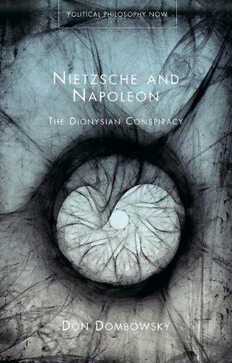
Nietzsche and Napoleon: The Dionysian Conspiracy PDF
Preview Nietzsche and Napoleon: The Dionysian Conspiracy
POLITICAL PHILOSOPHY NOW Chief Editor of the Series: Howard Williams, Aberystwyth University, Wales Associate Editors: Wolfgang Kersting, University of Kiel, Germany Steven B. Smith, Yale University, USA Peter Nicholson, University of York, England Renato Cristi, Wilfrid Laurier University, Waterloo, Canada Political Philosophy Now is a series which deals with authors, topics and periods in political philosophy from the perspective of their relevance to current debates. The series presents a spread of subjects and points of view from various traditions, which include European and New World debates in political philosophy. Also in series Hegel and Marx After the Fall of Communism David MacGregor Politics and Teleology in Kant Edited by Paul Formosa, Avery Goldman and Tatiana Patrone Identity, Politics and the Novel: The Aesthetic Moment Ian Fraser Kant on Sublimity and Morality Joshua Rayman Politics and Metaphysics in Kant Edited by Sorin Baiasu, Sami Pihlstrom and Howard Williams POLITICAL PHILOSOPHY NOW Nietzsche and Napoleon The Dionysian Conspiracy Don Dombowsky UNIVERSITY OF WALES PRESS • CARDIFF • 2014 © Don Dombowsky, 2014 All rights reserved. No part of this book may be reproduced in any material form (including photocopying or storing it in any medium by electronic means and whether or not transiently or incidentally to some other use of this publication) without the written permis- sion of the copyright owner except in accordance with the provisions of the Copyright, Designs and Patents Act 1988. Applications for the copyright owner’s written permission to reproduce any part of this publication should be addressed to the University of Wales Press, 10 Columbus Walk, Brigantine Place, Cardiff, CF10 4UP. www.uwp.co.uk British Library Cataloguing-i n- Publication Data A catalogue record for this book is available from the British Library. ISBN 978-1-7831-6096-9 eISBN 978-1-7831-6097-6 The right of Don Dombowsky to be identified as author of this work has been asserted in accordance with sections 77, 78 and 79 of the Copyright, Designs and Patents Act 1988. Typeset by Mark Heslington Ltd, Scarborough, North Yorkshire Printed by CPI Antony Rowe, Chippenham, Wiltshire Contents Acknowledgements vii List of Abbreviations viii Introduction: The Dionysian Conspiracy 1 1 Sources, Cults and Criticism: Nietzsche’s Portrait of Napoleon 6 2 Aristocratic Radicalism as a Species of Bonapartism 34 3 Napoleon III: ‘déshonneur’ 80 Conclusion: The Imperial European Future 118 Notes 124 Bibliography 182 Index 203 Acknowledgements I would like to offer my special thanks first to those who assisted me in the early stages of this project: Oleksandr Dubnov, Nathalie Lachance and Milanka Stojadinovic. Second, for critical comments and enlightening discussion: Thierry Choffat (Centre d’Études et de Recherches sur le Bonapartisme), Renato Cristi and all the partici- pants in the Nietzsche and Political Theory Workshop at the MANCEPT Ninth Annual Conference at the University of Manchester, UK, but specifically to Dan Conway, Hugo Drochon, Manuel Knoll, Ayumu Okubo, Barry Stocker and Rolf Zimmermann. I would also like to express my great appreciation to the staff at the Anna Amalia Bibliothek in Weimar, the Bibliothèque Martial Lapeyre at the Fondation Napoléon in Paris and the Universität Basel in Basel, Switzerland, as well as to Sylvie Coté, director of Research Services at Bishop’s University and the Social Sciences and Humanities Research Council of Canada. An early version of chapter 1 appeared in Herman W. Siemens and V. Roodt (eds), Nietzsche, Power and Politics: Rethinking Nietzsche’s Legacy for Political Thought (Berlin and New York: Walter de Gruyter, 2008). An early version of an excerpt from chapter 2 appeared in Manuel Knoll and Barry Stocker (eds), Nietzsche as Political Philosopher (Berlin and New York: Walter de Gruyter, 2014). List of Abbreviations AC The Anti-C hrist AOM Assorted Opinions and Maxims BGE Beyond Good and Evil BT The Birth of Tragedy CW The Case of Wagner D Daybreak EH Ecce Homo GM On the Genealogy of Morals GS The Gay Science HH Human, All Too Human KSA Kritische Studienausgabe PTG Philosophy in the Tragic Age of the Greeks TI Twilight of the Idols UM Untimely Meditations UW Unpublished Writings: From the Period of Unfashionable Observations WLN Writings From the Late Notebooks WP The Will to Power WS The Wanderer and His Shadow Z Thus Spoke Zarathustra Introduction: The Dionysian Conspiracy But later, beginning with Plato, philosophers became exiles, conspiring against their fatherland. Friedrich Nietzsche, Philosophy in the Tragic Age of the Greeks The progress of a physical conspiracy is arrested when the hand which holds the poignard is secured; but a moral conspiracy cannot be put down, sooner or later it will explode like a train of gunpowder. Napoleon Bonaparte The main goal of this study is to establish a definitive and compre- hensively demonstrated link between Aristocratic Radicalism, a term that encapsulates Friedrich Nietzsche’s political thought, and Bonapartism, the political ideology associated with the regimes of Napoleon I and Napoleon III. This study is comprised of three chapters. In the first chapter I will discuss Nietzsche’s Bonapartist precursors (in particular, Goethe and Stendhal) and explain how their readings of Napoleon informed Nietzsche’s own. Nietzsche read extensively both Napoleonic and anti- Napoleonic literature (including that of de Rémusat and Taine) and on the basis of these sources formulated his ‘problem’of Napoleon as a ‘synthesis of the inhuman and superhuman’ (GM I 16) and developed his understanding of Napoleon as a representa- tive of pagan antiquity and Renaissance virtù, a supreme commander type. I will demonstrate that Nietzsche’s ‘problem’ was not, however, simply a problem inviting an explanation of Napoleon’s personality that would uncover the Goethean insight that ‘the higher and the terrible man necessarily belong together’1 but that it was also about how to summon and regenerate a structural, political moment in the history of European culture, since Nietzsche evokes Napoleon as an exemplar intended to capture his politics of the future that involves the construction of durable, imperial institutions. In the second chapter I will consider Nietzsche’s Aristocratic Radicalism as an outgrowth of his reflections on Napoleon
